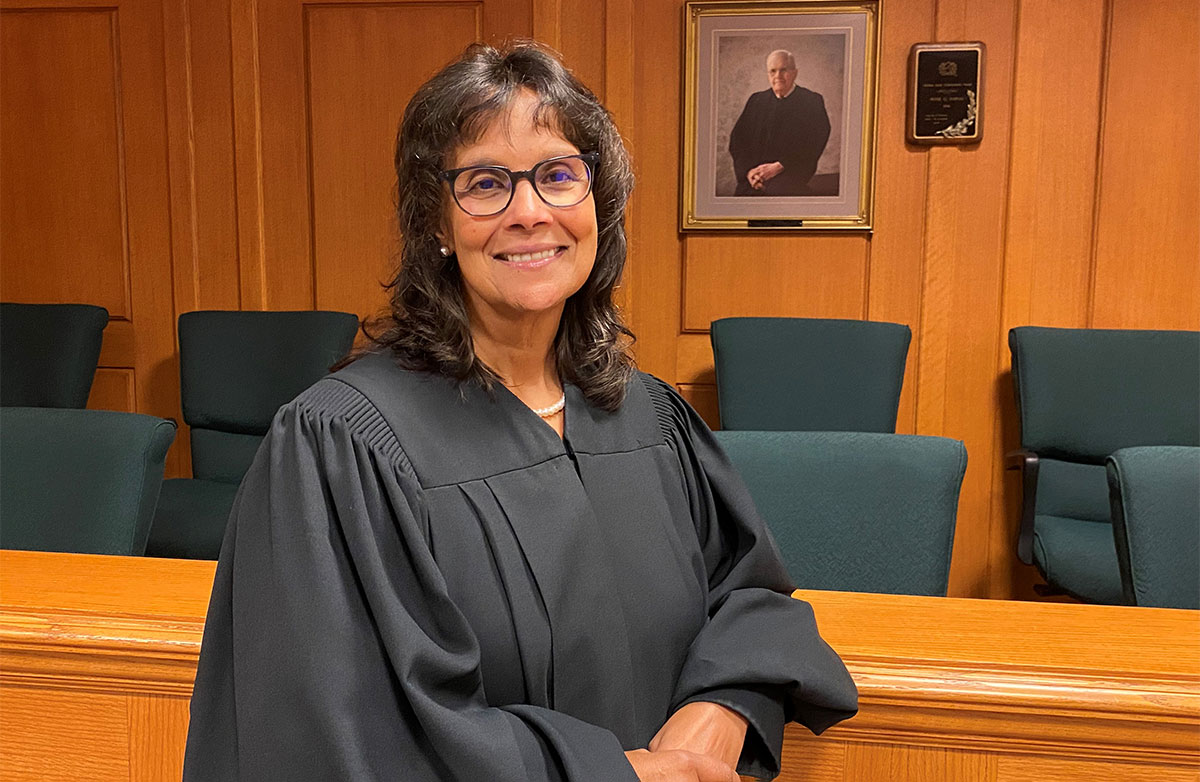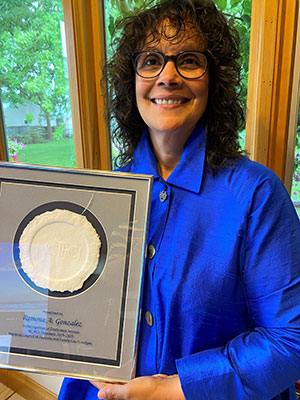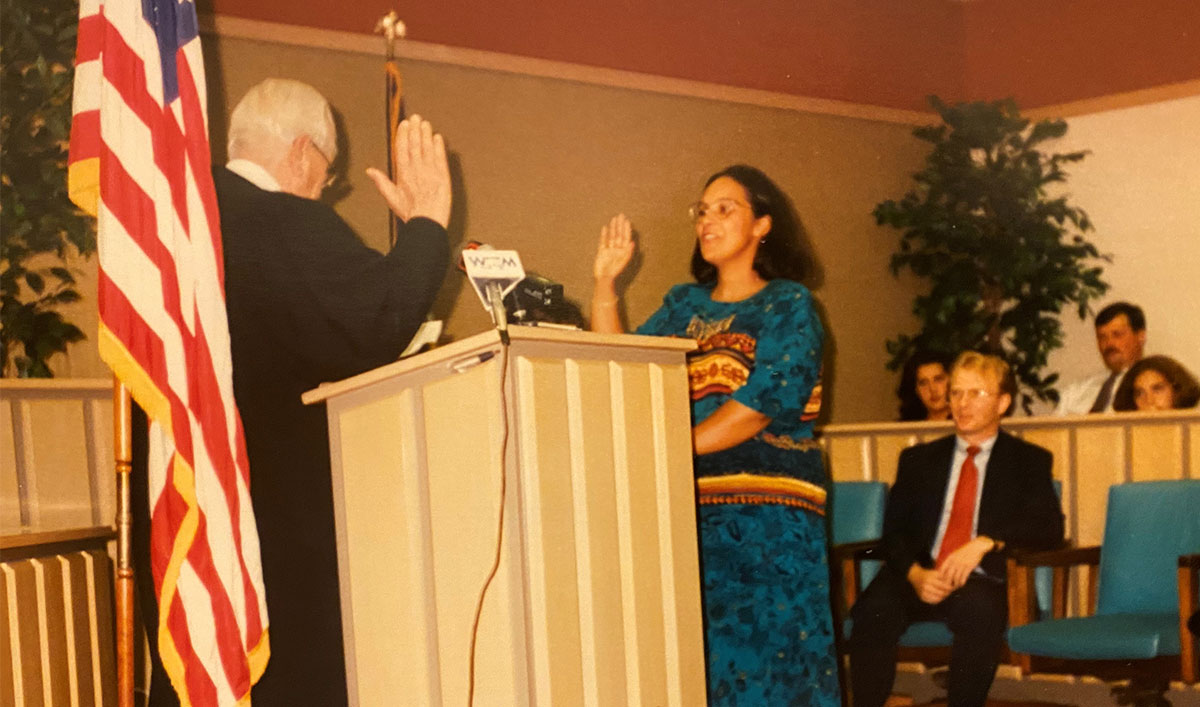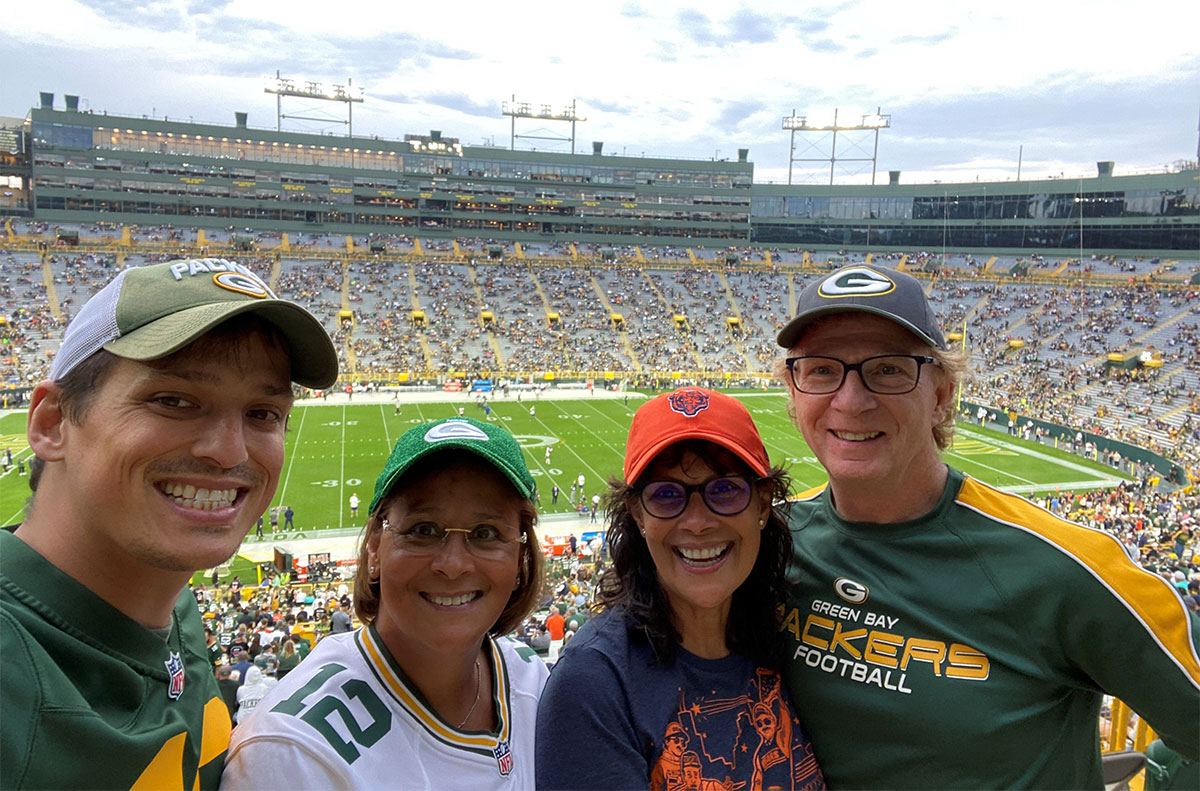
La Crosse Count Circuit Court Judge Ramona Gonzalez is the 2023 Lifetime Jurist. Over her shoulder in her courtroom is a portrait of one of her mentors and her Branch 1 predecessor, Judge Peter Pappas, who was recipient of a Lifetime Jurist Award in 1998.
May 17, 2023 – Judge Ramona Gonzalez’s father, a sister, a brother-in-law, two nephews, a niece, and two cousins are physicians. She chose law.
Her family emphasized education and a profession. Her father was Dr. Ramon A. Gonzalez, known for his family medicine clinics in Milwaukee that provided care for underserved communities through the Gonzalez Family Medical Center, later the Madre Angela Clinic.
A drive to work in a profession that serves the public, she said, came from her paternal grandparents in the Dominican Republic. It was from them that her father learned the importance of family, education, and service – and those values were passed along to her and her siblings.
Judge Gonzalez of La Crosse County Circuit Court is the 2023 recipient of the State Bar of Wisconsin Bench and Bar Committee's
Lifetime Jurist Award.
The award recognizes jurists who, during their tenure on the bench, were fair and impartial, demonstrated high ideals and personal character along with outstanding, long-term judicial service.
Judge Gonzalez’s high ideals and judicial competence have earned her a high level of respect and recognition within the La Crosse legal community and community at large, say those who nominated her.
Judge Gonzalez has demonstrated outstanding, long-term judicial service during her 28 years as a presiding judge and has long been committed to advancing judicial leadership and public service.
Additionally, through her work with the National Council of Juvenile and Family Court Judges, Judge Gonzalez has worked hard to improve national policy and system practices affecting children, families, and survivors of violence.
She would say – it all started with family.

In a virtual meeting in 2020, Judge Gonzalez holds the plaque to commemorate her term as president of the National Council of Juvenile and Family Court Judges.
From the Dominican Republic to Milwaukee
Ramona Gonzalez’s family immigrated to the U.S. in the early 1960s, when she was about 5 years old. “We had the choice: stay in the Dominican Republic and die, or go to the U.S. and live,” she said.
Initially, they found their way to Chicago. “We would not speak Spanish at home, because my father wanted us immersed in English. I actually learned my English from TV – where I learned the proper “Midwestern accent” that was prevalent on 1960s television, she said.
Her father, in a family medical practice in the Dominican Republic, continued his work as a physician in the U.S. After he finished his residency in radiology in Chicago, he and the family moved to Springville, New York, a small town in the western part of the state, where he joined a practice. “We were the new ‘exotic’ family,” Judge Gonzalez said.
She was in eighth grade, and avidly followed the news. “I went from three daily newspapers a day talking about the Vietnam War to Springville’s weekly journal, where the most important event was football on Friday nights,” she said.
Judge Gonzalez headed back to Chicago after finishing high school, attending Loyola University for her undergraduate degree. In 1976, her family also returned to the Midwest, moving to Wauwatosa and opened their first general practice medical clinic on Milwaukee’s north side for underserved individuals. Dr. Gonzalez dedicated himself to the care of his patients until he retired at age 80.
Working in a profession was a family requirement. But for her, “medicine – the family tradition – was never in the mix.” She knew early on she would become a lawyer.
“My father insisted he knew that, when I was born, I would be a lawyer,” she said. “He said it’s because I always wanted to argue about everything.” She had an uncle who was a lawyer, and growing up, she also watched a lot of
Perry Mason. “I wanted to be Perry Mason,” she said.
She applied only to Marquette University Law School, and was accepted. In addition to a law degree from Marquette, “I met the love of my life at Marquette,” she said.
She married John P. Stuber in 1981, and they moved to his hometown. He started Stuber Law Office in La Crosse – and is currently in the process of retiring. “He’s moved the practice home and doing the slowest retirement, waiting for my retirement as well.”
Together, they have three children who are also “the loves of my life,” she said. And joining them are “a multitude” of nieces and nephews. “Family is important.”
The Path to the Bench
Judge Gonzalez began her law career in May 1981, when she started work as a law clerk in La Crosse for Judge Peter G. Pappas and Judge Dennis Montabon. “They were both very important mentors to me,” she said. “Peter put the fear of God into many, many lawyers.”
 Shannon Green is communications writer for the State Bar of Wisconsin, Madison. She can be reached by
email or by phone at (608) 250-6135.
Shannon Green is communications writer for the State Bar of Wisconsin, Madison. She can be reached by
email or by phone at (608) 250-6135.
She worked in private practice for the next 15 years in La Crosse, initially with her husband. “I did everything,” she said – divorce, criminal, guardian ad litem, and more. “We were truly a general practice firm,” she said.
When her young daughter once observed to her parents at the dinner table that “all you talk about is work,” Judge Gonzalez chose to move to another firm – Bosshard and Associates.
“John Bosshard was a self-made banker and lawyer. He would see people at his Bangor office, and come back to the La Crosse office with these yellow legal pads filled with notes and ask me to help him with the various projects. We did everything – school board, estate planning, divorces, guardianships,” she said. “I was with his firm from about 1986 until I ran for judge in 1995.”
“John was also a very big influence in my life,” she said. She keeps a quote from his obituary in view. “’There is no such word as can’t.’ I keep that to remind me,” she said.
Choosing to run for the bench upon Judge Pappas’ retirement, Gonzalez started her campaign in the contested race very early on. “I went from one part of the county to the other,” she said.
Her two competitors “pretended I was no factor in the race. Then comes the primary and I’m on top,” she said. “I never looked back after that.”
On the Bench: Two Important Firsts
Judge Gonzalez was the first woman and the first person of color on the bench in La Crosse County. “And for the longest time I was the only woman judge in District 7,” she said.
That experience “did me well,” she said. Her much-valued mentors were nearly always “old, white-haired men” who taught her what she needed to know and encouraged her along the way, she said.
Not everyone, however, was happy to have her there, and she learned “to have a thick skin and a sense of humor.”
“Those were different times, and it’s been quite the journey,” she said. She became accustomed to being the only woman in the room, and knew that when she entered “the conversation changed, and there were those who didn’t like that. And there are certain conversations that shouldn’t be happening.” Knowing that most statements of bias toward her weren’t necessarily made out of malice, she found ways “get my point across.”
She gained another valued mentor in those early years: then Chief Justice Shirley Abrahamson. “She would call you at all hours. She’d still be in her chambers and needed to run something by you late at night,” she said. “She was always encouraging us to put ourselves out there in service to the people.”

Retiring Judge Peter Pappas swears in incoming Judge Gonzalez to the bench during a ceremony in 1995.
The Issues are Interconnected
In La Crosse County, she sees all types of cases and early into her time on the bench, noticed how cases are interrelated. “I have my nose in family, probate, civil, criminal matters. I saw the interconnectedness of these issues beyond the subject matter I was dealing with,” she said.
As judges, she said, you sometimes feel you’re “spinning your wheels” in seeing the same families in different matters. “Why not deal in with these in a holistic way, rather than compartmentalized?”
It’s this idea that underlies all her work on the bench: making the community safer and healthier. “You can’t do that if you compartmentalize these cases into different matters,” she said. “You can’t silo people’s lives.”
“After 28 years on the bench, I’ve seen our failures – such as kids in the system becoming adults who end up in prison – and I take those cases very hard. I ask: what should we have done differently, had we known then what we know now? That’s what informs everything I do,” she said.
The La Crosse community, she said, is one that embraces change – and in doing so, helps judges become innovative. More than 25 years ago, Judge Montabon championed change, initiating mediation and one judge-one family in child welfare case management. The result is that the courts in La Crosse are tangibly improving the lives of children “so we can get ahead of what’s coming in the future for our community,” she said. “Judge Montabon got us started, and we have been embracing change ever since.”
“I want to shine a light on our county,” she said, “because what we do here is good for the state and, frankly, the world to see. That started my outreach, nationally, across the state, internationally.”
Bail Bond and the SPD Emergency
On the discretion of judges to make cash bail decisions, a recent hot-button issue, Judge Gonzalez said “it wouldn’t be an issue if these cases didn’t have to wait so long to get a lawyer,” she said. A criminal charge is not a conviction. “Am I going to keep an indigent person in custody for a year when they can’t get a lawyer?”
Her calendar program’s main screen has a chart of how long her cases have been pending. “We go through my dashboard every week,” she said. She currently has 28 felony cases pending for more than 721 days – a problem that started well before the closing of courthouses due to the COVID-19 pandemic.
“Many times, once we get a public defender on the cases, they can resolve very quickly,” she said. But there are some instances where the Office of the Public Defender has tried more than 2,000 times to get a public defender, and the lengthy waits continually get worse.
“The system is nearly at a standstill because we don’t have enough prosecutors, defense attorneys, and court resources to get the work done,” she said. “I’ve stopped looking at my dashboard.”
Long waits don’t just interrupt the defendants’ lives. “There are victims who would like to go on with their lives, but these cases are still hanging. For many victims of domestic violence, all they want is the violence to stop, and that’s probably the one thing we can’t do for them,” she said.
“The human risk and toil that ordinary citizens have because of this systemic failure to fund parts of our justice system is shameful,” she said.
“You can be as tough on crime as you want, but if you haven’t provided the mechanism for the system to work to get to that conviction, you haven’t done anything to keep your community safer. That to me is the failure of the legislative leadership in Wisconsin. And it didn’t have to be that way. It’s sad,” she said.
The solution is not simply funding. “It’s a fundamental change of understanding that the protection of constitutional rights leads to safer communities. You can’t take a shortcut to that. Just holding people in jail doesn’t do that. We’ve tried to incarcerate our way out of safety concerns and it’s not working,” she said.
“To me, what we really want is safe communities, but you can’t get there if you starve the mechanism. We need to process cases in a timely way. We don’t have enough people to get to a timely hearing and trial and to an effective intervention.”
Her heroes right now? “The lawyers from across the state who step up and respond to my request to take the case. I will do what I have to for them – I freely use Zoom breakout rooms for them to talk privately with their clients,” she said.

Judge Ramona Gonzalez (second from right) with her family members at a Packers/Bears game in Lambeau Field, Green Bay, in September 2022. With her are, from left: nephew Rob Knavel; sister María Gonzalez Knavel, a retired partner with the Milwaukee office of Foley & Lardner; and husband John Stuber.
NCJFCJ: The National Council of Juvenile and Family Court Judges
This organization is the oldest judicial membership organization in the U.S., and provides training and knowledge for judges involved in family, juvenile, and domestic violence cases.
Judge Gonzalez, involved with NCJFCJ since 1998, has been involved in its leadership for 15 years and served as its president in 2019-20. Through her involvement, she has become a national and international speaker on domestic violence issues, and is a media contact for news and television on these issues, appearing on
NBC Nightly News in 2021. “You can’t be doing this work this long without people calling.” And that’s just fine. “It’s the Dominicana in me – I freely will give you my opinion,” she said with a laugh.
In 2019 as NCJFCJ president, she
testified before the House Judiciary Subcommittee on Crime, Terrorism, and Homeland Security on the Reauthorization of the Violence Against Women Act (VAWA).
Since she first took the bench, she said, the justice system’s response to domestic violence has showed improvement “because we are more cognizant of the fact that domestic violence isn’t just about a physical act, but has to be placed in context,” she said. “We are moving in a direction I see as more holistic,” and are more culturally aware. Yet there is still more awareness needed. “It’s hard for people to see the nuances of these cases. There’s been improvement – but there’s a ways to go yet.”
Thoughts on the Award
“I’m touched to the core, because I think what I’ve been trying to accomplish all these years seems to be the perception,” she said in her response to receiving the Lifetime Jurist award.
In April 2022, after 27 years on the bench, she announced that she was going to retire. But she recalled that her father continued working up until age 80, and
passed away in August 2022.
In 2002, the
Milwaukee Journal Sentinel profiled him, quoting him as saying: “Working with poor people, you can never retire. There is no finishing the job. Poverty continues.”
That could be Judge Gonzalez’s philosophy, as well. Following her announcement in April 2022, she reversed her decision to retire. “I thought I was ready,” she said, realizing her work wasn’t yet done.
“As long as I can get on the bench each day and be in the moment for the people in front of me at that time, I’m here,” she said. “But the minute I start thinking about what others outside the courtroom are going to think about what’s happening here – that’s when I leave the bench.”
What’s next? Work in immigration with
KIND (Kids in Need of Defense), which provides representation to unaccompanied children appearing in immigration courts. “Five-year-olds go through the same process as adults,” she said. “We have to do better for kids.” Learn more in
her op-ed column from May 11, 2023, in
Newsweek.
